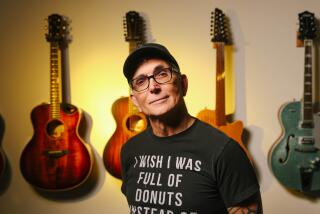Don’t be cruel
- Share via
On jan. 1, my local newspaper published a story about a fabulous New Year’s party held in a nearby nursing home. The story was accompanied by a photo of a middle-aged man in an Elvis Presley wig and aviator glasses who clearly believed himself to be the life of the party.
In the photo, “Elvis” was seen thrusting a microphone into the face of a senior citizen who appeared less than thrilled by the entertainer’s ministrations. Though the article assured readers that “it was definitely a festive atmosphere” at the nursing home that day, the photo said otherwise. The six seniors subjected to the song stylings of the Elvis impersonator looked bored, indifferent or alarmed. The only person who seemed to be enjoying himself was the clown in the Elvis wig.
I’d always known that life in a nursing home was no picnic, but not until I saw that photo did the extent of the horror become clear to me. It’s not just that helpless seniors are roped into enduring the antics of marauding karaoke boys. It’s that they are subjected to a style of music that has nothing to do with their lives and values, and, in Elvis’ case, confronted by a brand of music that is actually a repudiation of their tastes.
I once asked my mother, now 87, when she realized that the world no longer belonged to her.
“When Elvis came out,” she replied, without hesitation. Until Elvis showed up, it was possible to believe that the big bands of the ‘30s might make a comeback, that Duke Ellington and Count Basie might again rule the roost with their sophisticated ladies and sophisticated songs. But after rock ‘n’ roll erupted in the mid-1950s, these dreams evaporated. The Swing Era was kaput; songs such as “Moonlight Serenade” and “In a Sentimental Mood” were replaced by “(You Ain’t Nothin’ But a) Hound Dog” and “Great Balls of Fire.” For the Greatest Generation, the best years of their lives were over.
I have always liked Elvis. But I was born in 1950 and thus have never lived in a world he did not dominate. People like my mother, by contrast, viewed the arrival of Elvis et al as an assault: The hip-swiveling, the sexuality, the general vulgarity were elements they could never come to terms with. Over the years, as they softened, and as Elvis softened, they might come to tolerate his music, and perhaps even enjoy one or two of his tunes. But Elvis never meant anything to them.
Last week, I attended a birthday party at a nursing home for a woman I know who was turning 105. Sure enough, when it came time to cut the cake, and the festive music got queued up, it was not Louis Armstrong or Rudy Vallee or something vaguely appropriate to her age group that came blaring through the boom box. It was the peppy, ubiquitous, resolutely undignified “Hound Dog.” The birthday girl was already in her 50s when Elvis cut his first record; how could anyone at the nursing home think “Hound Dog” could possibly evoke any memories for her? Or were the opinions of those being feted no longer relevant in our fast-paced, modern world?
I am a great believer in showing respect for old people. They got here first, they built this economy, they know stuff. But part of the reason I show respect for seniors is because I hope I will be shown similar respect when I reach my 80s. And when I turn 87 and am strong-armed into attending a New Year’s party when I’d rather stay in my room rereading Pere Goriot, I don’t want some nitwit dressed up like Justin Timberlake shoving a microphone in my face and acting like I’m supposed to be thrilled. That’s why I’m staying in shape. Shove a mike in my face and I’ll shove it right back, sonny. This is particularly true if some jowly, middle-aged Eminem impersonator ever gets in my face. This thing could get ugly.
The strange thing is, if Elvis were here today, he’d probably feel the same way. By all accounts a courtly sort, Elvis would have known which tunes were appropriate in a nursing-home setting and which were not. One of the goofier films in my collection is a low-budget affair called “Bubba Ho-tep.” Released in 2002, 25 years after Elvis’ death, it’s about a rural nursing home plagued by demons from ancient Egypt whose residents include an aging Elvis Presley.
Though the uncompromising demands of ancestral, Nile Valley wraiths is the main theme of the film, the movie also deplores the horrible way people get treated in nursing homes, where not even the King is treated with dignity. And oh yes, the reason Elvis is trapped in the nursing home is because he unwisely traded places with a duplicitous Elvis Presley impersonator who now refuses to admit that he is not Elvis. That’s right: Even Elvis hates Elvis impersonators.
More to Read
The biggest entertainment stories
Get our big stories about Hollywood, film, television, music, arts, culture and more right in your inbox as soon as they publish.
You may occasionally receive promotional content from the Los Angeles Times.










